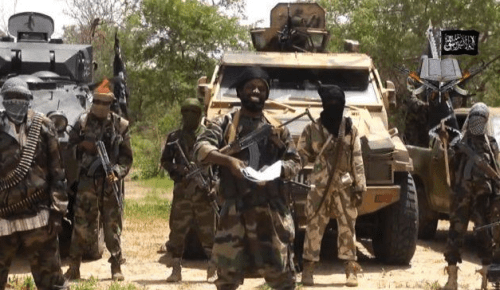Nigeria Islamic militant group, Boko Haram, has seized back the border town of Marte in northeastern Nigeria and attacked outlying villages Friday, weeks after the military said it had contained the Islamic extremists in a forest stronghold, an official said.
Deputy Gov. Zannah Umar Mustapha of Borno state also said officials fear hundreds of female suicide bombers have slipped into the state capital, Maiduguri.
They could have used the panic that ensued Wednesday night when hundreds of insurgents tried to attack Giwa Barracks, on the outskirts of Maiduguri, but met fierce resistance from troops who were firing heavy artillery for hours.
Twenty civilians were killed by the military cannon fire, according to Muhammad Gava, a spokesman for a civilian defense group that fights Boko Haram. Another 16 people died, including soldiers and civilian fighters, according to Gava.
It was the first major assault by Boko Haram since a multinational force from neighboring countries joined re-armed Nigerian troops to drive the insurgents out of dozens of towns and villages where they had declared an Islamic caliphate.
The offensive began at the end of January and by mid-March the military and government officials said the main fighting force of the insurgents was hemmed into the vast Sambisa Forest.
But the deputy governor told a news conference that it’s clear some insurgents are hiding in communities.
“We were thinking that the insurgency should have subsided,” Mustapha said. “Our thinking was that every other place should have been blocked so that the insurgency would be curtailed to a restricted area. But that has not been the case, because the insurgents have been fleeing to other communities.”
- Crisis pushes poor of western Chad to brink of hunger – UNICEF
Meanwhile, Disruptions to trade and an influx of refugees fleeing Boko Haram attacks in Nigeria have made life more difficult for people already struggling with a poor harvest in western Chad.
Since January, an estimated 18,000 Nigerian refugees and 8,500 Chadian returnees arrived in Chad, fleeing an insurgency by the Islamist militant group in northern Nigeria, according to UNICEF.
In six months the number of people living in “food insecurity” – without reliable access to enough affordable food – in Kanem, Barh El Gazal and Lake regions of western Chad has increased to 552,000 from 339,000, said UNICEF, citing World Food Programme (WFP) figures.
The region depends on trade with Nigeria, but with damage to infrastructure, a fall off in cross-border trade and continuing insecurity, markets for cattle and farm produce are shut down.
Follow @360Reporters

